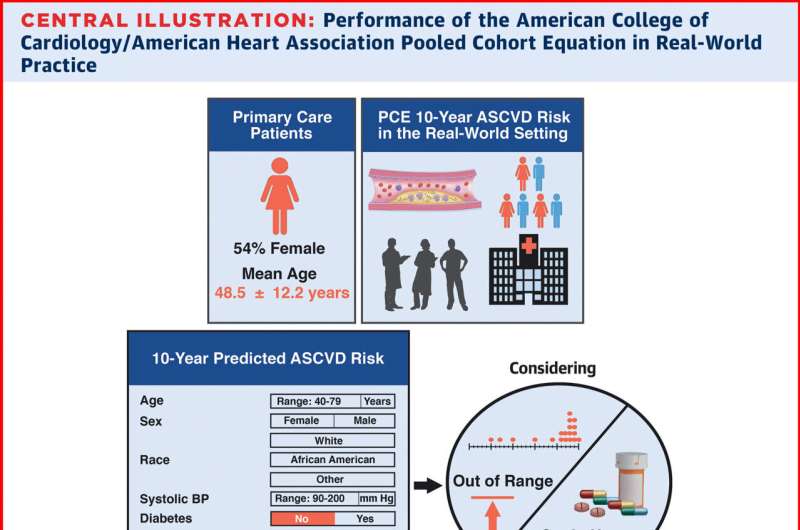This article has been reviewed according to Science X's editorial process and policies. Editors have highlighted the following attributes while ensuring the content's credibility:
fact-checked
peer-reviewed publication
trusted source
proofread
Real-world study confirms reliability of tool assessing 10-year risk prediction of heart disease

A recent study based on real-world community patient data confirms the effectiveness of the Pooled Cohort Equation (PCE), developed by the American Heart Association and the American College of Cardiology in 2013.
The PCE is used to estimate a person's 10-year risk of developing clogged arteries, also known as atherosclerosis, and guide heart attack and stroke prevention efforts. Study findings are published in the Journal of the American College of Cardiology.
The new study highlights to patients and clinicians the continued reliability and effectiveness of the PCE as a tool for assessing cardiovascular risk, regardless of statin use to lower cholesterol.
The PCE serves as a shared decision-making tool for a clinician and patient to evaluate their current status in preventing atherosclerotic cardiovascular disease. The calculator considers input in the categories of gender, age, race, total cholesterol, HDL cholesterol, systolic blood pressure, treatment for high blood pressure, diabetes status, and smoking status.
Using retrospective data from more than 30,000 patients enrolled in the Rochester Epidemiology Project, Mayo Clinic researchers found the PCE performed well at the community level and with relative accuracy between sexes, across age groups and race.
The use of statin medications to lower cholesterol did not change the value of the predictions, even though the PCE was developed before statins became widely available. The tool also retained its accuracy when using measurement factors, such as blood pressure, age and cholesterol levels, that were outside the original risk profile range.
"We have seen the excellent performance of the Pooled Cohort Equation over the years in clinical practice," says Francisco Lopez-Jimenez, M.D., a cardiologist at Mayo Clinic and senior author of the study.
"The study shows that this tool is reliable, not only in light of new cholesterol-lowering drugs, but for patients who previously were not evaluated with the PCE because maybe their blood pressure was higher or lower than the standards, or they did not fit the age profile, for example. By including patients with values outside the accepted range, I think we can calculate the risk for heart attacks in another 20% to 25% of patients, which is not small."
Lifestyle modification is essentially the mainstay of cardiovascular disease prevention, and clinicians talk with patients about what to focus on to prevent the serious consequences of a heart attack or stroke.
"Beyond wellness questions about exercise, diet, stress level and good sleep, the PCE guides the conversation to decide if it's time to talk about starting treatment for high cholesterol or hypertension. With this study, we wanted to provide confidence that the Pooled Cohort Equation still performs well at the community level, and our data supports that," says Jose Medina-Inojosa, M.D., a research scientist at Mayo Clinic and first author of the study.
More information: Jose R. Medina-Inojosa et al, Performance of the ACC/AHA Pooled Cohort Cardiovascular Risk Equations in Clinical Practice, Journal of the American College of Cardiology (2023). DOI: 10.1016/j.jacc.2023.07.018





















